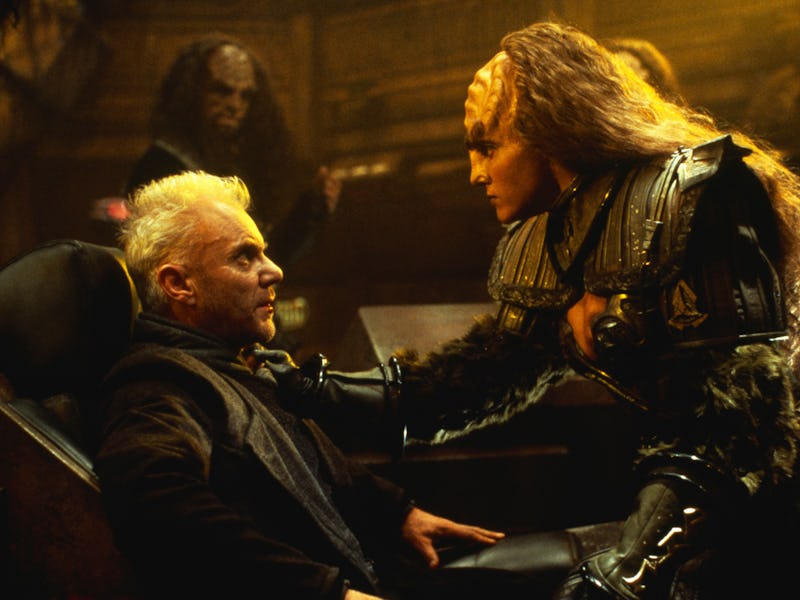The Most Forgettable Star Trek Movie Saw the Future of Sci-Fi Storytelling
What if two legendary characters met... for a few minutes?

As Marvel brings back Robert Downey Jr. and Star Wars refuses to step beyond the long shadows of the Skywalker family, major franchises are more prone than ever to mistaking Easter eggs and callbacks for plotting. This is confusing to anyone outside the hardcore fandom; Ahsoka was rather dull to those who hadn’t watched the old cartoon preceding it, and the pauses Deadpool & Wolverine built in so theater-goers could gasp at the brief cameos of characters last seen decades ago feel silly when you’re watching at home.
But this nostalgia-first, story-never strategy can have its perks. Despite middling reviews, Deadpool & Wolverine became the most profitable R-rated movie ever, while also fueling a metric petabyte of YouTube explainers to keep the buzz going. It makes you wonder if Star Trek Generations, released 30 years ago today, was ahead of its time.
Conceived as a handover between, well, generations, the movie hit theaters just six months after The Next Generation concluded its seven-year TV run. Meant to kick off a series of films akin to the six the Original Series cast helmed, Generations starred the Next Gen cast but also featured William Shatner reprising his role as Captain Kirk (because in genre storytelling, a character being long dead is no excuse not to make use of them).
Captains Kirk and Picard coming face-to-face was a major component of Generation’s marketing, although it drags its feet on the big event about as much as Freddy vs. Jason. After an opening that sees a retired Kirk meet his end while helping the Enterprise-B rescue people from a mysterious “energy ribbon” cruising through space, we jump ahead 78 years to Picard and the Enterprise-D crew responding to an attack on a stellar observatory. The only constant between the scenes is Malcolm McDowell, who plays a long-lived alien named Soran.
That ribbon turns out to be a portal to another dimension called the Nexus, and anyone who manages to reach it will enjoy a dreamy eternity of wish fulfillment. It’s essentially sci-fi heaven, and Soran will do anything — including blow up a couple stars and murder hundreds of millions — to reach it and be reunited with a blissful illusion of his lost family. But Picard opposes both mass murder and the rejection of reality, so he pursues Soran across space and into the heart of the Nexus.
Generations’ creators clearly enjoyed having a larger budget than on TV.
It's here, after an extended nautical sequence, a spaceship battle, another blown-up Enterprise, and a subplot about Data gaining the capacity for emotion, that the much-ballyhooed crossover finally happens. Kirk actually survived but had been swept into the Nexus, where Picard finds him enjoying a taste of what life could have been had he put romance ahead of career. One jolt of reality later, and Kirk joins Picard for a quick hop into the past, where he sacrifices his life to stop Soran’s plan.
Middling reviews complained that Generations was bogged down by technobabble and in-jokes, while the fans those in-jokes were aimed at nitpicked plot points and objected to Kirk’s anticlimactic demise. But removed from the expectations set by the casting gimmick and Next Gen’s strong final seasons, that reception is a touch harsh. It’s no lost classic — from the deflector array talk to the requisite exploding consoles, it’s the kind of movie someone might picture if you ask a non-Trek fan to imagine a Trek film — but it’s not a bad way to while away a lazy afternoon either.
Most notably, it’s a movie tinged with mortality and regret, or at least as much as a movie that also features Brent Spiner singing about scanning for lifeforms can be. McDowell brings out his theatrical side as Soran rages against time’s mercilessness. Kirk, with no family to speak of, finds retirement lonely and aimless, and when Picard receives word that his brother and nephew have perished in a freak accident, he grapples with the sober realization that he’ll be the last of his line. It’s not exactly Samuel Beckett, but there is more to chew on here than “Hey, remember Electra?”
Kirk and Picard confront the ravages of time together.
While Patrick Stewart gives these scenes genuine emotional heft, it’s almost comical to see Kirk and Picard fret about their legacies, knowing that the former would be rebooted for the big screen while the latter would star in a television series that pulled a son out of canonical thin air for him. Forget the practical effects of its day; nothing dates Generations more than a pop culture character played by a mere 54-year-old facing questions about retirement.
Now that every franchise on the planet is obsessed with mashing characters from the past together like action figures, Kirk’s once-lame end now feels almost merciful. Picard has been fun, but it also feels like a televised retirement home for the 84-year-old Stewart and other Trek actors, whose characters will never be allowed to rest. Kirk, unlike so many other pop culture titans, got to enjoy a definitive end.
Generations was overshadowed by the superior First Contact two years later, but revisited with both its own middling reviews and its message about the futility of living in the past in mind, it feels like a warning about trying to coast by on nostalgia. It might be pleasant for a while, but Kirk ultimately rejected the Nexus because he realized that too much safety and predictability is boring. Pop culture franchises that don’t learn the same lesson could get stuck forever.